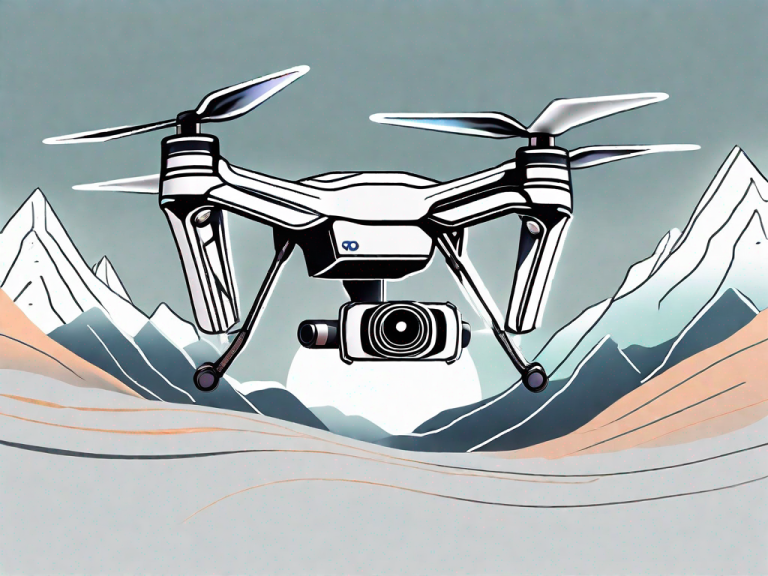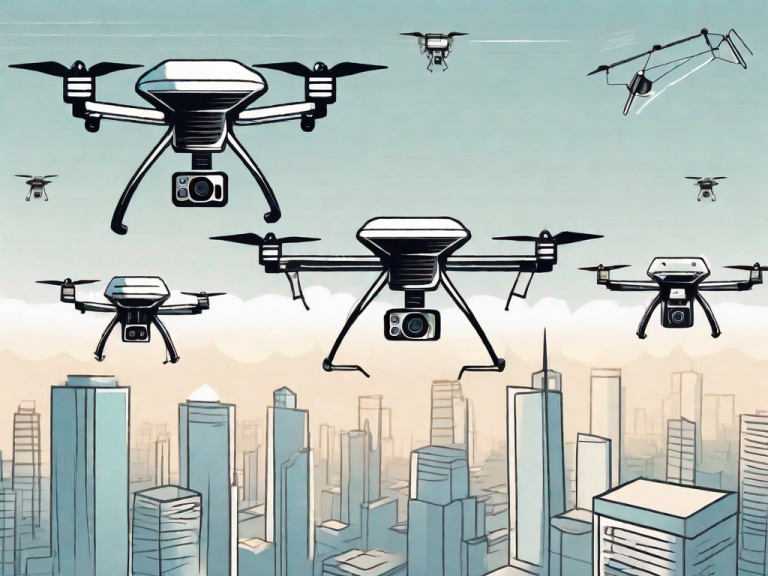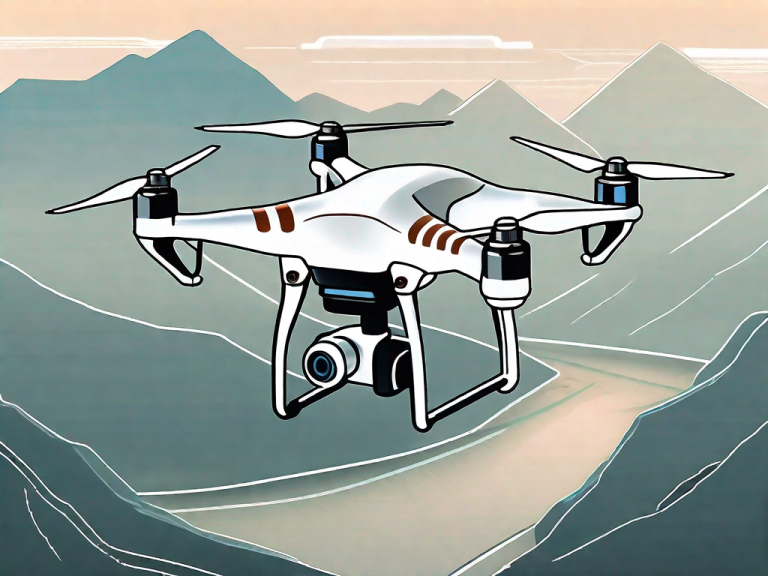Drones have become increasingly popular in recent years, with their applications ranging from recreational use to commercial purposes. However, with their growing prevalence, concerns about privacy and safety have also arisen. This has led to the development of drone detection apps, which aim to address these concerns by providing users with the ability to detect and track drones in their vicinity. In this article, we will explore the importance of drone detection, how these apps work, the key features to look for, and review the top drone detection apps available in the market. Finally, we will discuss how to choose the right app for your specific needs and provide insights into the future of drone detection technology.
Understanding Drone Detection
Drone detection involves the use of technology to identify and locate unmanned aerial vehicles (UAVs) in real-time. The importance of drone detection cannot be overstated, as it plays a crucial role in maintaining security, privacy, and safety. Whether it’s preventing unauthorized surveillance, protecting critical infrastructure, or ensuring public safety during large events, the ability to detect drones has become essential in today’s world.
But what exactly makes drone detection so important? Let’s delve deeper into the subject.
The Importance of Drone Detection
One of the primary reasons for the growing importance of drone detection is the potential risks associated with drones. While most drone operators adhere to regulations and use their devices responsibly, there is always the possibility of misuse.
Imagine a scenario where a drone is used to smuggle contraband into a correctional facility. The consequences could be severe, compromising the safety and security of the facility as well as the individuals within it. By detecting and tracking drones, these potential risks can be mitigated, ensuring the safety and privacy of individuals and organizations.
Furthermore, drones can also pose a threat to privacy. Unauthorized surveillance using drones can invade personal spaces and capture footage without consent. By having effective drone detection systems in place, individuals can have peace of mind knowing that their privacy is being protected.
How Drone Detection Works
Now that we understand the importance of drone detection, let’s explore how these systems actually work.
Drone detection apps utilize a combination of technologies to detect and track UAVs. These technologies include radio frequency (RF) sensors, radar systems, acoustic sensors, and visual detection algorithms.
Radio frequency sensors are designed to detect the signals emitted by drones. By analyzing the frequency and strength of these signals, the system can identify the presence of a drone in the vicinity. Radar systems, on the other hand, use radio waves to detect and track the movement of drones. These systems can provide valuable information such as the drone’s speed, altitude, and direction.
Acoustic sensors play a crucial role in drone detection by detecting the unique sound signatures produced by drones. By analyzing these sound patterns, the system can determine if a drone is present and its approximate location.
Visual detection algorithms are another important component of drone detection systems. These algorithms analyze video feeds from cameras to identify drones based on their visual characteristics, such as shape and size. Some apps even employ Artificial Intelligence (AI) algorithms to differentiate between drones and other flying objects, reducing false positives.
By using a multi-sensor approach, these drone detection apps are able to accurately identify and locate drones in real-time, providing valuable information to security personnel.
As technology continues to advance, so does the field of drone detection. New and innovative methods are being developed to improve the accuracy and efficiency of these systems. From advanced AI algorithms to sophisticated sensor technologies, the future of drone detection looks promising.
Features of a Good Drone Detection App
When choosing a drone detection app, it is essential to consider the following key features:
Real-Time Tracking
A good drone detection app should provide real-time tracking functionality, allowing users to monitor drone activity as it happens. This feature enables immediate response and enhances situational awareness, ensuring timely action can be taken when needed. Whether it’s alerting security personnel, notifying law enforcement, or initiating countermeasures, real-time tracking is crucial for effective drone detection.
Real-time tracking goes beyond just displaying the location of the drone on a map. It should also provide detailed information about the drone, such as its altitude, speed, and direction of travel. This level of detail allows users to assess the potential threat posed by the drone and make informed decisions accordingly.
Furthermore, a good drone detection app should have the capability to track multiple drones simultaneously. This is particularly important in situations where there may be multiple unauthorized drones operating in the same area. The app should be able to differentiate between different drones and provide individual tracking information for each one.
Range of Detection
The range of detection refers to the maximum distance at which a drone can be detected by the app. It is essential to choose an app that offers a wide range of detection to cover large areas effectively. The range can vary depending on the technologies employed by the app, so it is important to consider this factor based on your specific needs.
Some drone detection apps utilize radar technology to detect drones, which can provide a longer range of detection compared to other methods. Radar-based detection systems can detect drones at distances of several kilometers, making them suitable for monitoring large areas such as airports, stadiums, or critical infrastructure sites.
However, it is worth noting that the range of detection can be affected by various factors, including the size and type of the drone, environmental conditions, and the presence of obstacles. Therefore, it is important to choose a drone detection app that takes these factors into account and provides accurate and reliable detection within the specified range.
User Interface and Experience
The user interface (UI) and overall user experience (UX) are also vital considerations when selecting a drone detection app. The UI should be intuitive and easy to navigate, allowing users to access the app’s features and information effortlessly. Additionally, the UX should be seamless, providing a smooth and enjoyable experience for users. A well-designed UI/UX enhances the overall usability and effectiveness of the app.
When it comes to the UI, it is important to have clear and concise visual representations of the drone’s location and tracking information. This can include interactive maps, charts, and graphs that provide real-time updates on the drone’s movements. The UI should also allow users to customize their display preferences, such as zoom levels, color schemes, and information overlays, to suit their specific needs and preferences.
Moreover, the UX should prioritize ease of use and accessibility. The app should be designed with a user-centric approach, considering the needs and capabilities of the users. This includes features such as clear and understandable instructions, logical navigation paths, and responsive design that adapts to different screen sizes and devices.
In conclusion, when selecting a drone detection app, it is important to consider features such as real-time tracking, range of detection, and user interface and experience. By choosing an app that excels in these areas, you can enhance your ability to detect and respond to unauthorized drone activity effectively.
Reviewing the Top Drone Detection Apps
Now let’s take a closer look at some of the top drone detection apps available in the market:
App 1: Key Features and Benefits
App 1 is renowned for its advanced AI algorithms, which enable precise detection and tracking of drones. With real-time alerts and a user-friendly interface, it provides an excellent user experience. The app also offers a wide range of detection, making it suitable for large-scale deployments. Additionally, App 1 provides detailed analytics and reporting, allowing users to analyze and interpret drone activity effectively.
One of the standout features of App 1 is its ability to detect drones with high accuracy. The advanced AI algorithms analyze various parameters such as flight patterns, altitude, and speed to identify potential drone threats. This level of precision ensures that users can rely on App 1 to provide accurate and timely alerts.
Furthermore, the user-friendly interface of App 1 makes it easy for users to navigate and access the app’s features. The intuitive design allows even those with limited technical knowledge to effectively use the app and make the most of its capabilities.
In addition to its detection capabilities, App 1 offers a comprehensive range of analytics and reporting tools. Users can analyze drone activity patterns, track historical data, and generate detailed reports for further analysis. This feature is particularly useful for organizations that need to monitor and evaluate drone activity over time.
App 2: Key Features and Benefits
App 2 stands out for its emphasis on privacy and data security. It employs encryption and anonymization techniques to protect user data and ensure confidentiality. The app offers real-time tracking and customizable alert notifications, enabling users to tailor their preferences based on their specific requirements. With a sleek and intuitive design, App 2 provides an enjoyable user experience.
Privacy and data security are of utmost importance in today’s digital landscape, and App 2 addresses these concerns effectively. By employing encryption and anonymization techniques, the app ensures that user data remains secure and protected from unauthorized access.
Real-time tracking is another key feature of App 2. Users can monitor drone activity in real-time, receiving instant updates and alerts. This allows for quick response and intervention, ensuring the safety and security of the surrounding area.
App 2 also offers customizable alert notifications, allowing users to set their preferences based on their specific needs. Whether it’s receiving alerts for certain types of drones or setting thresholds for drone proximity, users have the flexibility to tailor the app to their requirements.
App 3: Key Features and Benefits
App 3 boasts a wide range of detection, coupled with an extensive database of known drone signatures. This allows for quick and accurate identification of drones, minimizing false positives. The app offers real-time tracking, as well as historical data analysis, providing users with valuable insights into drone activity patterns. App 3 also supports integration with existing security systems, maximizing its effectiveness in various environments.
One of the key strengths of App 3 is its extensive database of known drone signatures. This database allows the app to quickly identify drones based on their unique characteristics, minimizing false positives and ensuring accurate detection.
Real-time tracking is another feature that sets App 3 apart. Users can monitor drone activity in real-time, receiving live updates and alerts. This feature is particularly useful in situations where immediate action is required to mitigate potential risks.
App 3 also offers historical data analysis, allowing users to gain valuable insights into drone activity patterns over time. By analyzing trends and patterns, users can make informed decisions and implement effective strategies to address drone-related challenges.
Furthermore, App 3 supports integration with existing security systems, enhancing its effectiveness in various environments. By seamlessly integrating with other security measures, the app can provide a comprehensive and cohesive security solution.
Choosing the Right Drone Detection App for You
Choosing the right drone detection app requires careful consideration of your specific needs and requirements. Here are some factors to keep in mind:
Considering Your Specific Needs
Identify the primary purpose for using a drone detection app. Is it to protect your personal privacy, ensure the security of your organization, or maintain public safety during events? By understanding your specific needs, you can narrow down the options and choose an app that aligns with your objectives.
Evaluating App Performance and Reviews
Research and compare the performance of different drone detection apps. Look for user reviews and ratings to gauge the overall satisfaction of existing users. Pay attention to any potential drawbacks or limitations highlighted by reviewers, as this can provide valuable insights when making your decision.
Understanding Pricing and Subscription Models
Consider the pricing and subscription models offered by the drone detection apps. Some apps may require a one-time purchase, while others may have monthly or annual subscription plans. Evaluate the features included in each pricing option and determine which provides the best value for your investment.
The Future of Drone Detection Apps
As technology continues to advance, the future of drone detection appears promising. Here are some emerging trends and technological advancements to look out for:
Emerging Trends in Drone Detection
The use of machine learning and AI algorithms is expected to become more prevalent in drone detection apps. These technologies enable more accurate and efficient detection, enhancing the overall effectiveness of the apps. Additionally, the integration of drone detection with existing security systems and infrastructure is likely to increase, creating a comprehensive and interconnected security ecosystem.
Technological Advancements to Look Out For
Advancements in sensor technology, such as improved radar systems and enhanced visual detection algorithms, will contribute to the evolution of drone detection apps. Additionally, the development of counter-drone technologies, such as jamming and intercepting systems, will provide users with more comprehensive solutions. These advancements will further strengthen the capabilities of drone detection apps in preventing misuse and ensuring public safety.
FAQs
Q1: Can a drone detection app jam or intercept a drone?
A1: No, drone detection apps do not have the capability to jam or intercept a drone. They are designed to detect and track drones, providing users with information about their presence. The responsibility of countering the drone lies with law enforcement or other authorized entities.
Q2: Will a drone detection app interfere with other wireless devices?
A2: Drone detection apps typically use RF sensors, which operate on designated frequency bands. These sensors are designed to minimize interference with other wireless devices. However, it is always recommended to follow the app’s guidelines and ensure that other wireless devices are not in close proximity to the sensors for optimal performance.
Q3: Can a drone detection app differentiate between different types of drones?
A3: Yes, many drone detection apps utilize AI algorithms to differentiate between different types of drones. These algorithms analyze various factors, such as flight patterns, size, and speed, to determine the type of drone. This allows users to identify potential risks and take appropriate action accordingly.
Q4: Are drone detection apps legal?
A4: Yes, drone detection apps are legal and play a crucial role in maintaining security and privacy. However, it is important to comply with local laws and regulations regarding drone detection and use. Users should familiarize themselves with their country’s drone laws and ensure that they are using the app responsibly and in accordance with these laws.
Q5: Do drone detection apps work in all weather conditions?
A5: While drone detection apps are designed to work in various weather conditions, extreme weather conditions, such as heavy rain or strong winds, can affect their performance. Additionally, fog and low visibility may hinder the detection capabilities of the app. It is important to consider these factors and choose an app that is suitable for the prevailing weather conditions in your area.
Q6: Can a drone detection app be used in restricted airspace?
A6: It is essential to follow local aviation regulations when using a drone detection app in restricted airspace. Some apps may require authorization or special permissions to operate in such areas. Users should consult with relevant authorities and ensure compliance with all applicable regulations before using a drone detection app in restricted airspace.
Q7: Can a drone detection app detect multiple drones simultaneously?
A7: Yes, drone detection apps are capable of detecting and tracking multiple drones simultaneously. Their multi-sensor approach and advanced algorithms enable efficient detection and monitoring of multiple UAVs. This is particularly useful in crowded areas or scenarios where there may be multiple drones in close proximity.
| App | Real-Time Tracking | Range of Detection | User Interface | Price |
|---|---|---|---|---|
| App 1 | Yes | Up to 5 miles | Intuitive | $39.99/month |
| App 2 | Yes | Up to 3 miles | Sleek | $29.99/month |
| App 3 | Yes | Up to 7 miles | User-friendly | $49.99/month |
Conclusion
In conclusion, choosing the best drone detection app is essential for maintaining security, privacy, and safety in an increasingly drone-filled world. With real-time tracking, a wide range of detection, and a user-friendly interface, these apps provide valuable tools to detect and monitor drones effectively. By evaluating your specific needs, considering performance and reviews, and understanding pricing and subscription models, you can make an informed decision and choose the right app for you. As technology continues to advance, the future of drone detection looks promising, with emerging trends and technological advancements further improving the capabilities of these apps. So stay vigilant, stay protected, and enjoy the benefits that the best drone detection app has to offer.









